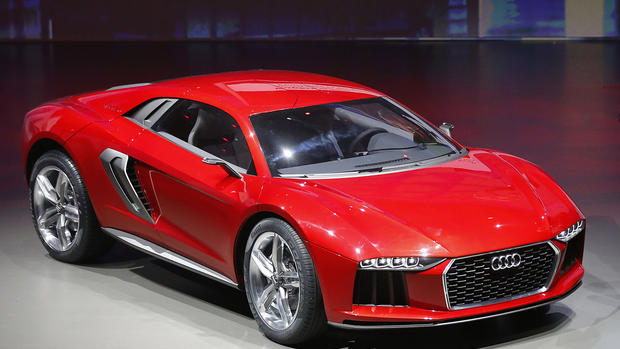Carmakers upbeat at Frankfurt as market steadies
FRANKFURT, Germany The dizzying decline in Europe's car market may have halted, but sales will remain at low levels for years, manufacturers at the Frankfurt Auto Show warned as they set out to wow customers with green vehicles and new technology.
Car shows, such as the Frankfurt event, are supposed to capture buyers' imaginations, with music-pumping presentations of new models and wild designs. But in the past few years, there haven't been many European car companies in the mood to dream. Last year, new car registrations in the European Union were at their lowest level since 1995 at around 12 million cars. Before the crisis began, that figure was near 16 million.
But at this year's Frankfurt Auto Show, which opens to the public on Saturday, the mood was starting to brighten -- even if the market may be slow to follow.
"We are at some tipping point here in Europe," said analyst Carlos Da Silva of IHS Automotive. "We are seeing the light at the end of the tunnel."
A U.S. sales recovery has improved the mood -- but industry officials say Europe has only stabilized at low levels and a rebound is far off.
Christian Klinger, marketing and sales chief for Volkswagen, whose range runs from the everyman's Golf to Porsches and Lamborghinis, said that in Europe, sales were "stabilizing at a low level."
Mercedes-Benz chief executive Dieter Zetsche said the rest of the year would see some improvement, but warned it would not be "steep."
As well as a U.S.-Europe divide, there is a split within the European car market. German carmakers, which have steady earnings from their luxury lineups, have fared the crisis fairly well. Zetsche reminded reporters that Mercedes grew even as the market fell.
The battle is far fiercer for lower-priced producers such as General Motors' Opel and France's PSA Peugeot Citroen
And so carmakers are setting out to lure in new customers - and top on their list seem to be young people, many of whom have turned away from their parents' SUV's toward bicycles, car-sharing and public transport. Manufacturers seemed to be trying to make driving cool, even revolutionary, again.
BMW opened the first press day Tuesday with a song shouting "we are young" and a presentation including footage of people tearing down the Berlin Wall. The night before, Mercedes addressed concerns about a growing class divide, saying that being a premium carmaker didn't necessarily mean only luxury, but the "claim to make things better all the time."
Both focused on their hybrid and electric lines. Mercedes turned the spotlight on its compact B-class electric drive and a car-sharing service using the Smart subcompact. BMW showed off an electric motorcycle and i-series electric cars, including the compact i3, with its bubble-like exterior reminiscent of an old VW bug.
Volkswagen, meanwhile, is displaying four electric or hybrid cars, including an electric version of its small Up! city car and mainstay Golf compact.
With hybrids and electrics only 0.2 percent of the market, analysts say that the prospects for sales and profits remain uncertain. They can help companies meet government requirements for lower average emissions - and position them to be ready if such vehicles take off.
Zetsche of Mercedes added that the only way to perfect the technology, which still needs work, is to actually make cars on an industrial scale and sell them.
"We don't expect that this (market) will have any kind of explosive development," Zetsche told reporters. "But we will see a long phase of steady, slow substitution of conventional power trends by alternative ones."
